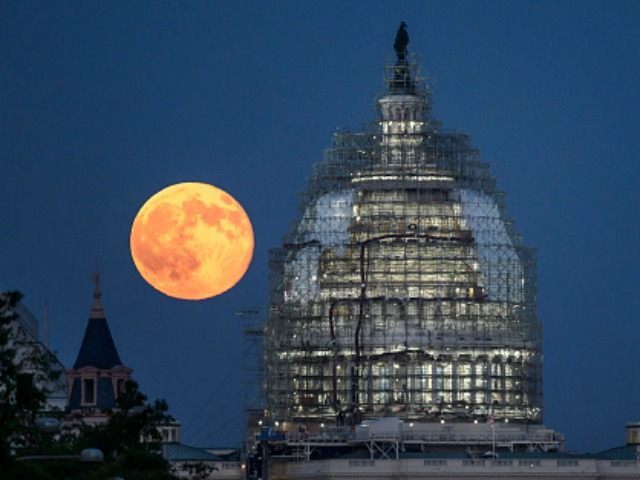GOP leaders in Congress are preparing to rush through a two-year budget that would leave President Barack Obama with roughly $40 billion in extra domestic spending, plus an unfettered ability to attack undefended conservative causes via his regulations and management directives.
Last last night, Congress released the outlines of the 144-page deal, which is slated to last until October 2017.
Leaders are “clearing the barn” of high-priority spending disputes, said Daniel Horowitz, the senior editor at Conservative Review.
But GOP leaders and legislators “are refusing to use the power of the purse” to win voters’ policy priorities, he said. They “are essentially nullifying James Madison’s plan to give Congress the power of the purse,” Horowitz added.
If Republicans “will not fight [for conservatives’ goals with] the budget… it is systematic breakdown of [constitutional] checks and balances,” he said.
In practical terms, he said, GOP politicians “are allowing Obama in his most final, most dangerous year, to do whatever he wants to transform the country.”
The New York Times’ report says the deal “frees Mr. Obama from budget battles as he looks to secure his legacy in the remainder of his second term.”
“This budget and debt deal is being brokered by a lame duck speaker and a lame duck president,” said a Oct. 27 statement from Heritage Action For America. “It represents the very worst of Washington – a last minute deal that increases spending and debt under the auspices of fiscal responsibility. If this deal moves forward, it will undermine efforts to unite the party by those promising to advance serious policy reforms.”
The closed-door deal is being derided online as “#ZombieBudget.”
But policy passivity allows GOP legislators to sidestep many contradictory demands from their donors and voters until 2017, Horowitz said.
The passivity, he said, is “just going to pour fuel on the [populist] fire” that has put two outsiders — real-estate magnate Donald Trump and brain-surgeon Ben Carson — far ahead of established GOP politicians in the 2016 race.
GOP and Democratic leaders hope to rush the $8 trillion budget deal through Congress in less than 48 hours, denying the public—or even congressional committees—any ability to debate the nation’s largest ever budget law.
That’s good for GOP leaders, who hope to elect Rep. Paul Ryan as House Speaker, Oct. 29, or as soon as the budget deal is passed, said Horowitz.
That rapid process is expected to minimize the populist blowback from the GOP’s diverse base as—once again—the GOP leadership fails to fight for their voters’ priorities, he said. So far, said Horowitz, Ryan “is either silent or complicit in it” in the back-room deal.
The budget outlined early Oct. 27:
- Would hide one hugely unpopular increase of roughly $1.5 trillion to the federal government’s credit limit — dubbed the ‘debt ceiling’ — within the larger and unprecedented two-year $8 trillion federal budget. That’s much less politically painful that undergoing two debates to pass two one-year debt-ceiling votes.
- Would provide contractors and agencies with roughly $112 billion in extra domestic and military spending until October 2017, and give legislators the ability to claim the the extra spending will be offset by future spending cuts, as far distant as 2025.
- Would spend so much money— more than $1 trillion on defense, for example — and will be rushed through Congress so fast that few voters will notice how the deal imposes a two-year delay on the 2011 “sequestration” budget-plan that has sharply slowed the growth of federal spending since 2011.
- Would eliminate most budget debates before the next presidential election, saving incumbents from casting election-year budget votes that would annoy donors, party loyalists or swing-voters.
- Would block a sharp increase in Medicare payments due from older voters.
- The deal includes a new provision giving the federal government far more power over agricultural loans, likely giving progressives yet another tool to expand their power over farmers and rural communities.
- Would deny Congress the “power of the purse” for two years, while leaving Obama freer to push his last-year progressive agenda via regulations and management directives. For example, Obama has used his management power to accept more than 240,000 Central American migrants since 2010.
This surrender of congressional power would allow Republicans and Democrats to shrug their shoulders every time voters protest when Obama ticks another item off his political bucket-list — Accept more Islamist refugees? Offer a new type of amnesty to illegals? Impose tougher curbs on energy use? Free domestic criminals? Expand gun regulations? Convert another region into national park? Reduce military standards to boost weaker female soldiers or force salutes of sex-blurring cross-dressers? Expand Obamacare? Expand regulation of religion?
The draft deal does not include any mention of curbs on immigrants, migrants, refugees, work permits, border, parole, or sentencing, Planned Parenthood, or Obama’s nuclear deal with Iran.
It would also ensure that the new president—Republican or Democrat—could not pass a big budget during their first, and most important year in office.
That provision is welcomed by both parties because it would partially offset the loss of the presidential election. It could also be good for Sen. Mitch McConnell’s GOP Senators in the Senate, who are expected to lose their majority because many Democratic-leaning States will pick Senators in 2016.

COMMENTS
Please let us know if you're having issues with commenting.